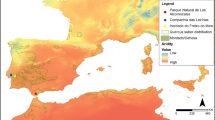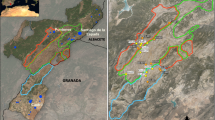Abstract
The importance of cultural ecosystem services (CES) for indigenous peoples is considered a key factor determining the effectiveness of conservation strategies in areas they inhabit. We conducted a study of the CES of the Maniq indigenous community in the rainforest of southern Thailand to determine the degree to which they depend on CES using single and group interviews and field observations. We established the Maniq rely on and engage with 11 CES in their daily lives: rituals, beliefs, myths and stories, aesthetics, spiritual values, language, wisdom, knowledge and transmission, inspirations, social relationships, and recreation. Understanding of the values attributed to these CES is essential for government environmental policies to effectively manage the ecosystem while respecting Maniq local ecological knowledge (LEK) and ethnic and cultural identity.

















Similar content being viewed by others
References
Albrecht, G., & Moser., J. (1998). Recent Mani Settlements in Satun Province, Southern Thailand. Journal of the Siam Society, 86: 161–199. http://siamese-heritage.org/jsspdf/1991/JSS_086_0j_AlbrechtMoser_RecentManiSettlementsInSatun.pdf
Bark, R. H., Barber, M., Jackson, S., Maclean, K., Pollino, C., & Moggridge, B. (2015). Operationalising the ecosystem services approach in water planning: A case study of indigenous cultural values from the Murray-Darling Basin, Australia. International Journal of Biodiversity Science, Ecosystem Services & Management, 11, 239–249. https://doi.org/10.1080/21513732.2014.983549
Berkes, F. (2012). Sacred Ecology: Traditional Ecological Knowledge and Resource Management, 3rd ed. Routledge, New York. https://doi.org/10.4324/9780203123843
Brandt, J. (1961). The Negrito of peninsular Thailand. Journal of Siam Society, 49: 123–160. https://www.sac.or.th/databases/siamrarebooksold/main/index.php/history/jss/307-the-negrito-of-peninsular-thailand
Chan, K. M. A., Satterfield, T., & Goldstein, J. (2012). Rethinking ecosystem services to better address and navigate cultural values. Ecological Economics, 74, 8–18. https://doi.org/10.1016/j.ecolecon.2011.11.011
Cinner, J., Marnane, M. J., McClanahan, T. R., & Almany, G. R. (2006). Periodic closures as adaptive coral reef management in the Indo-Pacific. Ecology and Society 11 (1): 31. http://www.ecologyandsociety.org/vol11/iss1/art31/
Creswell, J. W. (2014). Research design: Qualitative, quantitative, and mixed methods approaches (4th ed.). SAGE Publications.
Daly, H. (2013). A further critique of growth economics. Ecological Economics, 88, 20–24. https://doi.org/10.1016/j.ecolecon.2013.01.007
Daniel, T. C., Daniel, T. C., Muhar, A., Arnberger, A., Aznar, O., Boyd, J. W., Chan, K. M. A., Costanza, R., Elmqvist, T., Flint, C. G., Gobster, P. H., Gret-Regamey, A., Lave, R., Muhar, S., Penker, M., Ribe, R. G., Schauppenlehner, T., Sikor, T., Soloviy, I., … von der Dunk, A. (2012). Contributions of cultural services to the ecosystem services agenda. Proceedings of the National Academy of Sciences of the United States of America, 109, 8812–8819. https://doi.org/10.1073/pnas.1114773109
Dodson, M. (1997). Land rights and social justice. In: Yunupingu, G. (Ed.), Our land is our Life: Land rights—past, present and future. University of Queensland Press, St Lucia. 39–51. https://www.austlit.edu.au/austlit/page/C707972
Dodson, M. (2010). The dispossession of indigenous peoples: and its consequences. Parity (Magazine), 23(9): 6–7. https://openresearch-repository.anu.edu.au/bitstream/1885/10682/1/Dodson_Dispossession Indigenous2010.pdf
Duangchan, P. (2006). Glossary of Aslian languages: The northern Aslian languages of southern Thailand. Mon-Khmer Studies Journal, 36, 207–224.
Endicott, P. (2013). Introduction: Revisiting the “Negrito” hypothesis: A transdisciplinary approach to human prehistory in southeast Asia. Human Biology, 85(1/3), 7–20. https://doi.org/10.3378/027.085.0301
Garibaldi, A., & Turner, N. (2004). Cultural keystone species: implications for ecological conservation and restoration. Ecology and Society 9(3): 1. [online] http://www.ecologyandsociety.org/vol9/iss3/art1/
Gould, R. K., Ardoin, N. M., Woodside, U., Satterfield, T., Hannahs, N., Daily, G. C., & Stockholms, U. (2014a). The forest has a story: Cultural ecosystem services in Kona. Hawaii. Ecology and Society, 19(3), 55. https://doi.org/10.5751/ES-06893-190355
Gould, R. K., Klain, S. C., Ardoin, N. M., Satterfield, T., Woodside, U., Hannahs, N., & Chan, K. M. (2014b). A protocol for eliciting nonmaterial values through a cultural ecosystem services frame. Conservation Biology, 29, 575–586. https://doi.org/10.1111/cobi.12407
Graham, J., Amos, B., & Plumptre, T. (2003). Governance Principles for Protected Areas in the 21st Century. Canada: Institute on Governance in collaboration with Parks Canada and Canadian International Development Agency, Ottawa, Canada.
Hamilton, A. (2006). Reflections of the disappearing Sakai: A tribal minority in southern Thailand. Journal of Southeast Asian Studies, 37, 293–314. https://doi.org/10.1017/S0022463406000567
Kricheff, D. A., & Lukas., H. (2015). Being Maniq: Practice and identity in the forests of Southern Thailand. Hunter Gatherer Research, 1, 139–155. https://doi.org/10.3828/hgr.2015.9
Lukas, H. (2004). Can ‘They’ Save ‘Us’, the Foragers? Indonesian and Thai Hunter-Gatherer Cultures Under Threat from Outside. Südostasien Working Papers, Band 2. Vienna: Commission for Social Anthropology, Austrian Academy of Sciences. https://epub.oeaw.ac.at/0xc1aa5576_0x00080632.pdf
Lyver, P. O. B., Timoti, P., Jones, C. J., Richardson, S. J., Tahi, B. L., & Greenhalgh, S. (2016). An indigenous community-based monitoring system for assessing forest health in New Zealand. Biodiversity and Conservation, 26, 3183–3212. https://doi.org/10.1007/s10531-016-1142-6
Lyver, P. O. B., Timoti, P., Gormley, A. M., Jones, C. J., Richardson, S. J., Tahi, B. L., & Greenhalgh, S. (2017). Key Ma¯ori values strengthen the mapping of forest ecosystem services. Ecosystem Services, 27, 92–102. https://doi.org/10.1016/j.ecoser.2017.08.009
Maneenoon K., Sirirugsa P., & Sridith K. (2008). Ethnobotany of Dioscorea L. (Dioscoreaceae), a major food plant of the Sakai tribe at Banthad Range, Peninsular Thailand. Journal of Plants, People and Applied Research ,6: 385–394. https://www.ethnobotanyjournal.org/vol6/i1547-3465-06-385.pdf
Martín-López, B., Iniesta-Arandia, I., García-Llorente, M., Palomo, I., Casado-Arzuaga, I., Del Amo, D. G., Gómez-Baggethun, E., Oteros-Rozas, E., Palacios-Agundez, I., Willaarts, B., González, J. A., & o Santos-Martín, F., Onaindia, M., López-Santiago, C., and Montes, C. (2012). Uncovering ecosystem service bundles through social preferences. PLoS ONE, 7, e38970. https://doi.org/10.1371/journal.pone.0038970
Mascia, M., Brosius, J. P., Dobson, T. A., Forbes, B. C., Horowitz, L., McKean M. A., and Turner, N. J. (2003). Conser-vation and the social sciences. Conservation Biology, 17, 649–650. https://doi.org/10.1046/j.1523-1739.2003.01738.x
Millennium Ecosystem Assessment (MA). 2005. Ecosystems and Human Well-being: A Framework for Assessment. Island Press, Washington DC, USA. https://www.millenniumassessment.org/documents/document.356.aspx.pdf
Ouédraogo, I., Nacoulma, B. M. I., Hahn, K., & Thiombiano, A. (2014). Assessing ecosystem services based on indigenous knowledge in south-eastern Burkina Faso (West Africa). International Journal of Biodiversity Science, Ecosystem Services & Management, 10, 313–321. https://doi.org/10.1080/21513732.2014.950980
Pascua, P., McMillen, H., Ticktin, T., Vaughan, M., & Winter, K. B. (2017). Beyond services: A process and framework to incorporate cultural, genealogical, place-based, and indigenous relationships in ecosystem service assessments. Ecosystem Services, 26, 465–475. https://doi.org/10.1016/j.ecoser.2017.03.012
Pert, L. P., Hill, R., Maclean, K., Dale, A., Rist, P., Schmider, J., Talbot, L., & Tawake, L. (2015). Mapping cultural ecosystem services with rainforest aboriginal peoples: Integrating biocultural diversity, governance and social variation. Ecosystem Services, 13, 41–56. https://doi.org/10.1016/j.ecoser.2014.10.012
Plieninger, T., Dijks, S., Oteros-Rozas, E., & Bieling, C. (2013). Assessing, mapping, and quantifying cultural ecosystem services at community level. Land Use Policy, 33, 118–129. https://doi.org/10.1016/j.landusepol.2012.12.013
Pookajorn, S. (1991). Preliminary report of excavation at Moh-Khiew Cave, Krabi Province, Sakai Cave, Trang Province and Ethnoarchaeological research of hunter-gatherer group, so-called “Sakai” or “Semang” at Trang Province. Silpakorn University.
Protected Areas Regional Office 6. (2013). Surveying biodiversity in Khao Ban That Wildlife Sanctuary. Department of National Parks, Wildlife and Plant Conservation, Bangkok, Thailland.
Rattanakrajangsri, K., Maneerat, T. & Colchester, M. (2013). The Mani people of Thailand on the agricultural frontier. Conflict or Consent? The oil palm sector at a crossroads, Indonesia. 282–301. https://www.forestpeoples.org/sites/fpp/files/private/publication/2013/12/conflict-or-consent-chapter-11-mani-people-thailand-agricultural-frontier.pdf
Robinson, C. J., Janes, G., & Whitehead, P. J. (2016). Negotiating Indigenous benefits from payment for ecosystem service (PES) schemes. Global Environmental Change, 3, 21–29. https://doi.org/10.1016/j.gloenvcha.2016.02.004
Sagie, H., Morris, A., Rofè, Y., Orenstein, D. E., & Groner, E. (2013). Cross-cultural perceptions of ecosystem services: A social inquiry on both sides of the Israeli-jordanian border of the Southern Arava Valley Desert. Journal of Arid Environments, 97, 38–48. https://doi.org/10.1016/j.jaridenv.2013.05.007
Sangha, K. K., Butler, J. R. A., Delisle, A., & Stanley, O. (2011). Identifying links between ecosystem services and Aboriginal well-being and livelihoods in north Australia: applying the millennium ecosystem assessment framework. Journal of Environmental Science and Engineering 5: 931–946. http://ro.uow.edu.au/lhapapers/2082
Sangha, K. K., Brocque, A. L., Costanza, R., & Cadet-James, Y. (2015). Application of capability approach to assess the role of ecosystem services in the well-being of Indigenous Australians. Global Ecology and Conservation, 4, 445–458. https://doi.org/10.1016/j.gecco.2015.09.001
Sangha, K. K., & Russell-Smith, J. (2017). Towards an Indigenous ecosystem services valuation framework: A north Australian example. Conservation and Society, 15, 255–269. https://doi.org/10.4103/cs.cs_16_156
Sangha, K. K., Russell-Smith, J., & Costanza, R. (2019). Mainstreaming indigenous and local communities’connections with nature for policy decision-making. Global Ecology and Conservation, 19, 1–13. https://doi.org/10.1016/j.gecco.2019.e00668
Satterfield, T., Gregory, R., Klain, S., Roberts, M., & Chan, K. M. (2013). Culture, intangibles and metrics in environmental management. Journal of Environmental Management, 117, 103–114. https://doi.org/10.1016/j.jenvman.2012.11.033
Smith, E. A., Wishnie, M. (2000). Conservation and subsistence in small-scale societies Annual Review of Anthropology, 493–524. https://doi.org/10.1146/annurev.anthro.29.1.493
Acknowledgements
This research is supported financially by the National Research Council of Thailand [grant numbers NRCT(B)(KBNg)/79, 2018]. The authors gratefully acknowledge the Maniq people in the Banthat mountain range of southern Thailand for their time and the knowledge that they have rendered. We very much appreciate Dr. David James of the University of the Sunshine Coast, Australia, for his feedback on the earlier draft.
Author information
Authors and Affiliations
Corresponding author
Ethics declarations
Conflict of Interest
The authors declare that they have no conflict of interest.
Research Involving Human Participants
This study has approved of Human Research Ethics in accordance with declaration of Belmont of the Centre for Social and Behavioural Sciences Institutional Review Board, Prince of Songkla University, Thailand.
Additional information
Publisher's Note
Springer Nature remains neutral with regard to jurisdictional claims in published maps and institutional affiliations.
Supplementary Information
Below is the link to the electronic supplementary material.
Rights and permissions
About this article
Cite this article
Khunweechuay, N., Roongtawanreongsri, S. & Hatta, K. Cultural Forest Ecosystem Services of the Maniq Indigenous People in Southern Thailand. Hum Ecol 50, 559–576 (2022). https://doi.org/10.1007/s10745-022-00315-7
Accepted:
Published:
Issue Date:
DOI: https://doi.org/10.1007/s10745-022-00315-7




